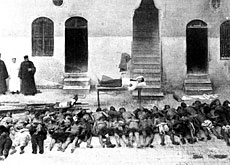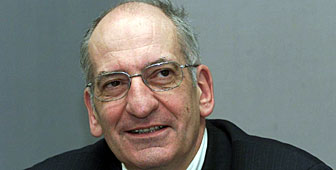Parliament recognises Armenian genocide

The House of Representatives has voted to officially recognise as genocide the 1915 killings of Armenians at the hands of Turkey.
The move comes almost three months after Ankara snubbed the Swiss foreign minister, Micheline Calmy-Rey, over a similar decision taken by a cantonal parliament.
On Tuesday, the House decided with 107 votes in favour, 67 against and 11 abstentions to recognise the massacre of ethnic Armenians during the Ottoman Empire.
Armenians say around 1.5 million people were killed; Turkey disputes this, putting the figure closer to 200,000.
The parliamentary chamber asked the Swiss government to inform Ankara of the vote through diplomatic channels.
The cabinet has in the past opposed adopting such a measure, arguing that it would “add to already charged relations between Turkey and Armenia”.
Reacting to the parliamentary decision, the foreign ministry said it hoped it would not have an adverse effect on relations with Turkey.
In a statement, Turkey’s foreign ministry said it “strongly condemned and rejected the decision.”
“It is unacceptable to unilaterally present as a genocide… these events that came out of the special conditions of the First World War and which caused great pain both for Turks and Armenians,” the statement said.
“Parliament took this decision by considering domestic politics and by ignoring relations between Turkey and Switzerland and the feelings and thoughts of Turks in the country.”
“It bears the responsibility for the negative consequences that the decision can lead to.”
Swiss-based Armenian groups welcomed the vote.
Snub
In September, Ankara withdrew at the last minute an invitation to Calmy-Rey to travel to Turkey.
At the centre of the controversy was a decision by the parliament of canton Vaud to officially recognise the killings of Armenians as genocide.
At the time, Calmy-Rey told Swiss radio that the Turkish reaction to the move was “exaggerated”.
She regretted that Turkey’s step had “complicated bilateral relations” between the two countries.
Vaud was the second canton after Geneva to classify the Turkish campaign against the Armenians as genocide.
Armenian departure
From 1915, the Turkish authorities deported Armenians, whose land was divided between the Ottoman Empire and Russia, into the Mesopotamian desert.
The Turks feared that the Armenians would claim independence and that Christian Armenians would collaborate with Russia.
Ankara, which strenuously denies that the deaths constituted a genocide, has warned Bern in the past about giving official recognition to the massacre.
In 2001, the Swiss parliament narrowly voted against calling it a genocide, preferring to refer to the killings as “tragic events”.
The parliaments of a number of European countries, including France, Italy, Sweden, Russia, Greece and Belgium, have all recognised the Armenian killings as genocide.
swissinfo with agencies
Parliament voted to officially recognise as genocide the killing of Armenians from 1915.
Some 107 members of the House of Representatives voted in favour of the resolution, 67 opposed and 11 abstained.
Switzerland is the 15th country to label the killings as genocide.
Switzerland’s cabinet has in the past opposed such a step, arguing that it could hurt relations with Turkey.

In compliance with the JTI standards
More: SWI swissinfo.ch certified by the Journalism Trust Initiative











You can find an overview of ongoing debates with our journalists here . Please join us!
If you want to start a conversation about a topic raised in this article or want to report factual errors, email us at english@swissinfo.ch.